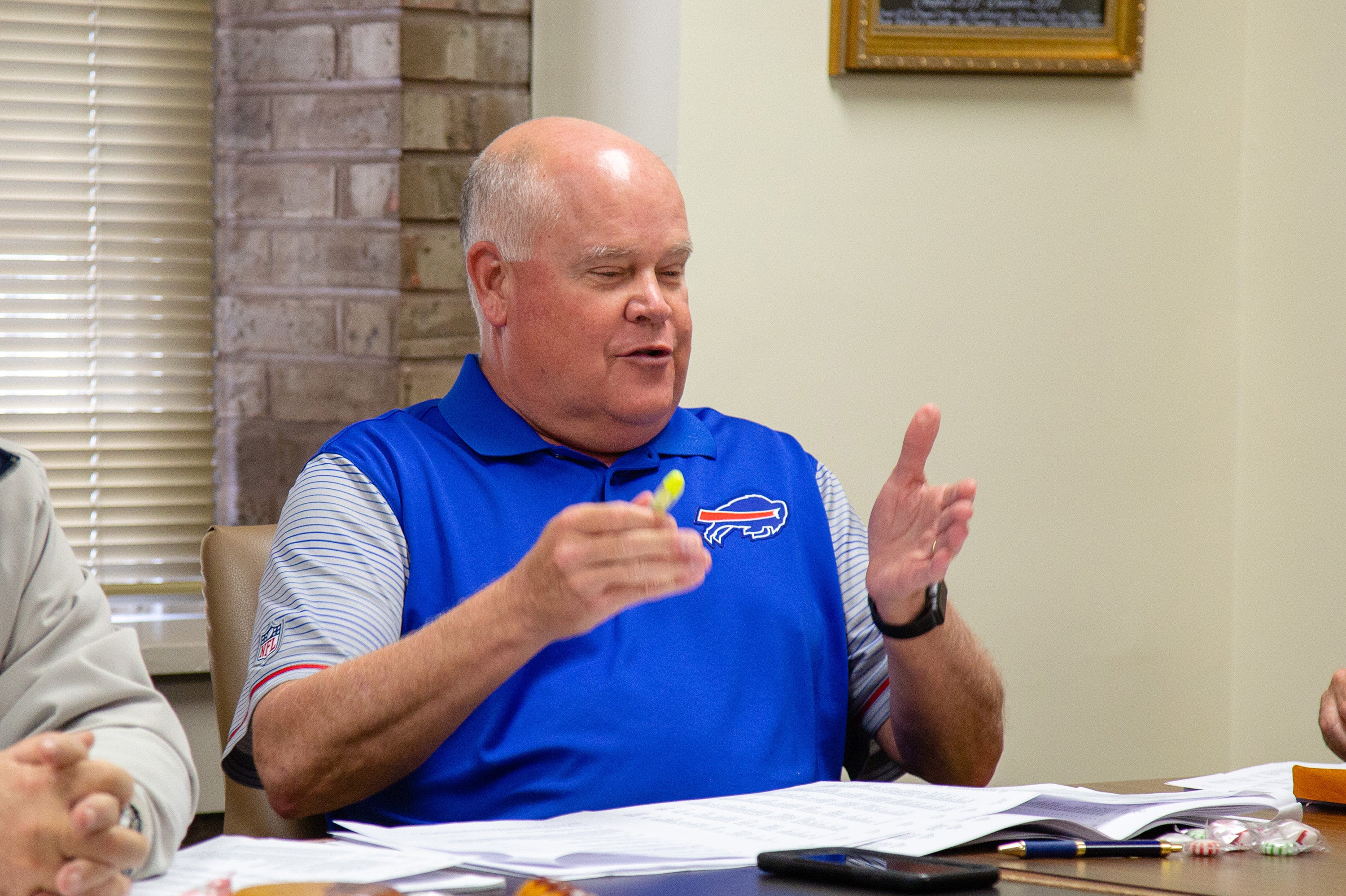Magistrates worried Boyle left out of 911 infrastructure upgrade
Published 7:32 pm Wednesday, May 1, 2019

- Boyle County Magistrate Jamey Gay talks about the sheriff's budget during Tuesday's budget workshop. Photo by Ben Kleppinger.
Funding the Boyle County Sheriff’s Office and Boyle County EMS would cost the county’s general fund a total of around $2.2 million under the proposed budget for 2019-20.
The sheriff’s office has its own pair of budgets and receives some funding through fees, but the county would still need to contribute $1.2 million to operate the office, Boyle County Treasurer Mary Conley said during a budget workshop this week.

Boyle County Magistrate Jason Cullen participates in a budget workshop session Tuesday. Photo by Ben Kleppinger.
Boyle County EMS would have a net cost of a little more than $1 million after accounting for $1.26 million in revenue from billing for medical runs.
A lengthy portion of the discussion about the sheriff’s budget focused on 911-earmarked funds and problems with radio communication in remote areas of Boyle County.
Boyle’s current budget plans for the county to transfer $325,000 to the City of Danville to cover costs at the 911 call center run by the city. That cost is projected to be much lower — around $201,000 — this year; the proposed budget keeps expected spending at $325,000 for next year.
In addition, Boyle County transfers all the 911-earmarked revenues it collects from a state tax on cellphones and a local fee on landline telephones to the city. The county is expecting to collect about $237,000 in those revenues in the proposed budget.
The current arrangement was created after a contentious process in 2017, when the city and county were arguing over around $800,000 in 911-earmarked funds that the county had saved up. At one point, Boyle County threatened to stop using Danville’s 911 center and partner with Bluegrass 911 in Garrard County instead. But things were eventually worked out and the county transferred its 911 savings over to the city.
Conley said at Tuesday’s workshop that the city has spent most of the $800,000 and there’s about $200,000 left now. Danville recently completed a relocation of the 911 center to the basement at city hall, including upgrades to the furniture and the addition of “next generation” 911 technology.
Conley said she is concerned about how much of the savings has been spent.
“One of our long-term concerns should be, as a fiscal court, if there has to be an upgrade, what’s the mechanism here?” she asked. “How are we saving money? And how are we moving forward with funds available.”
Sheriff Derek Robbins told magistrates issues with radio communications between the deputies and Danville police officers have been resolved — deputies can now hear and communicate directly with officers. But, Robbins noted, radio coverage quality for the sheriff’s office has not changed — there are still patches in rural Boyle County, especially in the knobs of western Boyle County, where radios work poorly.
Danville recently upgraded its repeater system to a “simulcast” system that makes it a lot easier for them to communicate. But Boyle County has not seen an upgrade to its repeaters, Robbins said.
That raised a red flag for some magistrates. “Is there anything in this agreement that states the whole infrastructure should be upgraded as one, not just a particular entity?” Magistrate Jason Cullen asked.

Boyle County Sheriff Derek Robbins says Danville Police Department recently benefitted from an upgrade its radio repeater system, but Boyle County deputies’ repeaters have not been upgraded. Photo by Ben Kleppinger.
“No,” Conley said.
“That’s the point I was going to make,” Magistrate Jamey Gay said. “… It is a total 911 system, county-wide, so the infrastructure does need to be upgraded county-wide. … We do need to have that conversation with the city and point out where the holes are and get the city (with) the 911 money to improve the infrastructure.”
Cullen said he would like to see invoices of what the 911-earmarked money the county handed over has been spent on, in order to verify whether it was used to upgrade Danville’s radios and not Boyle’s.
“It sounds like the City of Danville has gone above and beyond to make sure their officers are taken care of with money we’ve kicked in, right? Is that kind of where I’m at?” Cullen asked.
“I don’t know the answers,” Conley responded, explaining she doesn’t know enough about the technical side of 911 systems and radios.
Magistrate Tom Ellis said communication is difficult if not impossible in a third of his district, especially in the communities of Mitchellsburg, Parksville and Forkland. That difficulty can be dangerous for people like hunters who might need help and not have cell phone service; and dangerous for law enforcement if they can’t radio out for help, he said.
“Anybody will tell you it makes more fiscal responsibility to handle it all at once instead of doing it in pieces,” Cullen said. “… If you’re talking about upgrading systems, why would we upgrade city first and then do the county? It actually makes more sense to do the county because you’re providing a larger service.”
Magistrates ultimately took no action, but agreed to make sure their concerns and questions were brought up at the next quarterly 911 advisory committee meeting.
Read tomorrow’s Advocate-Messenger for more on the fiscal court’s discussion of the EMS budget and proposed raises for part-time EMS staff.






